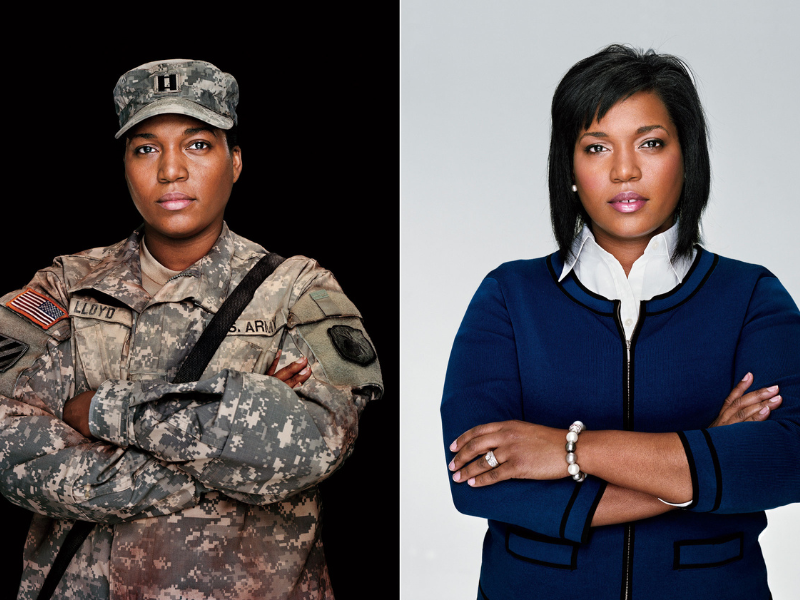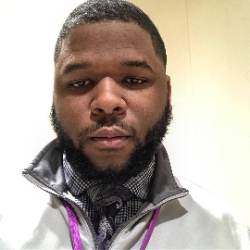More money and mentorship are key to helping veteran-owned businesses thrive
A year into the pandemic, Black veteran entrepreneurs were asked to take stock of their experiences. What they said may surprise you.
By Malik Keith and Linda Miller, Elevate Dayton
COVID-19 has exacted a heavy toll on the nation's 2.5 million veteran entrepreneurs. A survey conducted by Syracuse University’s Institute for Veterans and Military families found that, barely a year into the pandemic, 39% veteran-owned businesses had closed due to COVID-19, and more than 41% were operating at 20-40% capacity.
But the study also revealed some encouraging signs, especially among Black and African American entrepreneurs. For instance, we know that COVID-19 has disproportionately harmed minority-owned businesses as a whole. Yet veterans responding to the Syracuse survey were not any more likely to anticipate closing their businesses than White entrepreneurs.
In addition:
- 90% of Black and African American respondents said they were able to adapt their business during the pandemic;
- 83% were able to accommodate (themselves or employees) to work from home;
- And 78% believed their business/venture would survive the pandemic.
Two years later, the road to veteran entrepreneurship is still paved with obstacles, especially for women and people of color. In this story, the last installment in our COVID Can’t Stop Us editorial campaign, Elevate Dayton explores some of those barriers and what is being done to address them.

Source: Maury, R.; Tihic, M., Almissalati, N. (2021). Data Brief: Black & African American Veteran Entrepreneurs. Syracuse, NY: Institute for Veterans and Military Families, Syracuse University. © 2021, IVMF at Syracuse University
‘Vetrepreneurship’ declining
In the past, creating a business was the norm for nearly half of U.S. veterans who returned home from major conflicts. According to Syracuse University, nearly 50% of veterans who served in World War II started their own businesses, and roughly 40% of soldiers from the Korean War started businesses. But this is a trend that has dropped dramatically in recent years.
A report from the Bureau of Labor Statistics says less than 5% of the more than 3.6 million people who have served in America's armed forces since September 11, 2001, created a company.
One reason for the dropoff is a change in the types of available jobs. In the past, vets would come home, work on an assembly line, and climb the ladder into management positions, which would ultimately teach them the skills needed to be a business owner. In recent years, those manufacturing jobs have vanished, forcing veterans to acquire those skills in other ways.
Another factor has to do with the resources available to veterans returning from active duty. The G.I. Bill of World War II guaranteed loans for veterans who borrowed money to purchase a home, business or farm. The modern-day version does not.
Another factor could be that Americans with lower family incomes are more likely to join the military than those with higher family income, meaning they may have fewer financial resources with which to start a business.
In fact, access to capital remains the top-cited barrier for businesses owned by women and minority veterans. According to the most recent Syracuse University survey:
- 63% of Black entrepreneurs and 55% of women entrepreneurs say the capital they need is not readily available, compared to 44% of Whites and 41% of men;
- Black entrepreneurs (57%) and women (51%) were more likely to be turned down by a creditor or lender than Whites (52%) or men (36%);
- Black and women entrepreneurs also were less likely to apply for another loan after being turned down;
- And 50% of Black veterans and 44% of women were not able to secure any funding to expand or grow their business, compared to White veterans (25%) and men (27%).

Source: Maury, R.V.; Tihic, M., Feng., R. (2022). Data Brief: Black & African American Veteran Entrepreneurs. Syracuse, NY: Institute for Veterans and Military Families, Syracuse University. © 2022, IVMF at Syracuse University
Despite these barriers, the number of women military entrepreneurs continues to rise. Between 2007 and 2012, according to U.S. Census Bureau data, the number of women veteran-owned companies almost quadrupled, to about 383,000 from just 97,000.
One Daytonian who has successfully made the transition from veteran to businesswoman is Juanita Darden, owner of Third Perk Cafe and soon-to-be-owner of a new soul food kitchen.

Juanita Darden has kept multiple businesses afloat during the pandemic. (Photos courtesy of Juanita Darden)
Darden weathered the challenges of running a business during the COVID-19 pandemic and is positioned to open a new restaurant in part because of assistance from the Paycheck Protection Program (PPP) and resources from the city of Dayton.
“The help was very important,” Darden said, “The money we received from the city was very instrumental.”
SEE RELATED STORY: Local business owner embarks on new business despite the pandemic
Another local Black woman entrepreneur who is expanding her business footprint in Dayton is Air Force veteran Charlynda Scales, founder and CEO of Mutt’s Sauce, LLC. Scales, who has an MBA in Strategic Leadership, started the company after inheriting a secret sauce recipe from her grandfather, Charlie “Mutt” Ferrell Jr., who also served in the Air Force, in Vietnam and the Korean War.
Recently, Scales teamed up with two other Black women entrepreneurs to co-found a large-scale commercial and training kitchen. The 6888 Kitchen Incubator (pronounced “six-triple-eight”) will be a two-story, 10,000-square-foot commercial kitchen, retail space and classroom situated inside the Dayton Arcade when it opens late next year or in early 2024.
Veterans often credit the leadership skills and other lessons from their military service for preparing them for entrepreneurship, and more recently, for helping them survive COVID—lessons like don’t accept defeat, utilize the resources you have, and always have a contingency plan. But making that initial leap to business owner isn’t for the faint-hearted.
SEE RELATED STORY: Collaboration helps Dayton entrepreneurs build resilience and foster collective responsibility
“The steady paycheck of the military — the stability of a full-time job — is a stark contrast to being a small business owner,” Scales told CNBC in a 2019 interview. “At every point, you’re trying to save on overhead, and there’s no part of your day that isn’t involved with saving money.”
One telling insight from the Syracuse studies is that while community development finance institutions (CDFIs) were instrumental in funneling much-needed federal COVID relief dollars to small businesses, they are rarely if ever utilized by veteran entrepreneurs. Just 1% of survey respondents tapped CDFIs in 2020 and 2021, making it one of the least utilized sources of capital.
Given that about half of veteran entrepreneurs require $50,000 or less for startup and growth, and that a primary purpose of CDFIs to invest in small businesses in low- and moderate-income neighborhoods, increasing awareness and access could pay big dividends for some minority-owned veteran businesses.
SEE RELATED STORY: The ABC’s of CDFIs

Source: Maury, R.; Tihic, M., Pritchard, A. (2022). Data Brief: Women Veteran Entrepreneurs. Syracuse, NY: D’Aniello Institute for Veterans and Military Families, Syracuse University. © 2022, IVMF at Syracuse University
Motivation and Mentorship
In 2020, 88 veteran-owned businesses received aid through the CARES (Coronavirus Aid, Relief, and Economic Security) Act in Montgomery County, according to the county’s website.
One of those businesses is Creek Technologies (CreekTech), a Service-Disabled Veteran-Owned Small Business (SDVOSB) that specializes in delivering innovative information technology solutions, educational services, and management consulting. The company was named one of “Dayton’s Fasted Growing Businesses” in 2019 and “Small Business of the Year'' by the Dayton Biz Journals.
Creek Tech CreekTech’s president and CEO, Lea Culver, served in the U.S. Army as part of the Army Space Program Office from 1983 to 1992. He specialized in engineering satellite imaging intelligence R&D systems and aerial reconnaissance systems supporting the Department of Defense and an array of federal agencies.
For Culver, being a fulltime businessman is a process that happened over time.
“When I came out and started Creek Technologies it was a type of a side gig,” Culver said. “When I made the shift over to be full-time in my businesses, I self-funded the company from 2007 through 2016.”

Source: Maury, R., Tihic, M., Pritchard, A., McKelvie, A., Euto, L. (2022, Jan). 2021 National Survey of Military-Affiliated Entrepreneurs. Syracuse, NY: Institute for Veterans and Military Families, Syracuse University. © 2022, IVMF at Syracuse University
In addition to funding, other challenges faced by aspiring veteran business owners include a lack of social capital, inadequate mentorship, and difficulty maintaining a positive work-life balance, according to the 2016 report Operation: Vetrepreneurship.
In fact, the opportunity to be financially independent consistently continues to rank among the top motivations for minority veterans starting a business, along with maintaining personal freedom and a desire to support their community, according to the 2021 Syracuse study.

Culver says it often takes veterans later in life to secure the resources and knowledge to start a business and he believes that can be having an impact on the decline in the number of veteran entrepreneurs. It is not that they have no desire to start a business. It just might take longer for them to reach that goal.
“Veterans are trained to be mission-oriented, but very few are trained to be business leaders,” Culver said.
According to the U.S. Small Business Administration’s Office of Advocacy, small veteran-owned businesses employ more than 5 million people across the United States. Additionally, they create revenue of more than $1.4 trillion a year, and a yearly payroll of $195 billion.
Fewer veteran business owners has a ripple effect because employers who once served in the armed forces are 30 percent more likely to hire other veterans, according to a 2012 study from the International Franchise Association.
“To continue service to this country, I’m doing it as a disabled service veteran that focuses on hiring veterans,” Culver said.
Licensing and Training
Another veteran-owned business in Dayton is The Next Wave, a marketing and advertising agency owned by David Esrati, who served in the U.S. Army from 1981 to 1987. In 2004, Esrati helped start VOB 108, a group of veteran business owners in Dayton whose mission is to support and help one another acquire skills, grow small businesses and win government contracts.
The federal government seeks to award at least 3% of all federal contracting dollars to Service-Disabled Veteran-Owned Small Businesses (SDVOSB) each year.
“We found that most contractors require a General Services Administration Schedule (GSA),” Esrati said. “If you are selling professional services, it gets more complicated.”
Esrati said if business owners aren’t able to obtain a certain level of contracts within a certain time period, they risk being taken off of the schedule, which ultimately puts their business at risk.

David Esrati founded VOB 108 to support veteran business owners in obtaining government contracts.
“There have been a lot of organizations that have tried to crack the code and get representation in federal contracting,” Esrati said. “To get past performance within the government system, the contract has to be $250,000 or bigger. It is not set up for very small businesses.”
Esrati also notes that transitioning to a volunteer force has led to fewer people with military experience.
“In World War II, Korea and Vietnam there was a draft,” said Esrati. “At one point a large majority of people in Congress all had military service. Now it is less than 10%. The military population is way smaller now.”
In response to the drop in veterans starting businesses, there has been a proliferation of courses, programs and incubators that help veteran entrepreneurs.
One of them is Boots to Businesses, run through the U.S. Small Business Association It involves training via military installations around the world through the U.S. Department of Defense Transitions Assistance Program (TAP). There is also the Women Veteran Entrepreneurship Training Program (WVETP), which offers training to women veterans and women spouses of service members as they grow their businesses.
In addition to funding and education for veterans who are aspiring businesses owners, both Culver and Esrati say much of the support will have to come from those who have already successfully made the transition, and the skills they learned in the military are qualities that are needed for those who want to start their own company.
“I can tell you that the discipline, the structure and the accountability is absolutely unheralded,” Esrati said. “Most veteran business owners I know would hire a veteran any day.”
Culver says he always keeps his door open for veterans who have questions or need a place to get started. He owns an office suite that he gives veterans access to for a full year without charge so they can establish a presence in the community. The space also gives new veteran business owners access to phones, internet and other essential tools. Culver says the shared experiences people have when they serve in the military is a special type of relationship, and he is committed to passing on his knowledge to fellow soldiers.
“I still mentor other smaller veteran business owners in common business practices,” Culver said. “Veterans are really a part of a fraternity and a brotherhood. It is a bond that transcends any type of relationship that we can form in life.”








